This is a joint post by Ricardo Muñoz Sánchez and Arianna Masciolini.
The 2024 Joint International Conference on Computational Linguistics, Language Resources and Evaluation (LREC-COLING 2024) was the result two major international players in the area of computational linguistics, the Language Resources Association (ELRA) and the International Committee on Computational Linguistics (ICCL), joining efforts to organize a large event bringing together researchers from a wide rage of subfields of language technology. With 1551 accepted papers, 27 tracks, over 40 workshops and tutorials and around 3000 participants, the vast majority of which onsite, the conference had a rich and stimulating - almost to the point of becoming overwhelming - programme and provided excellent networking opportunities despite some unfortunate technical issues that partly compromised the remote sessions. Of the four invited talks, we want to mention one by local guest speaker Michele Loporcaro. Its topic was Romance dialects of Italy, and it was especially well received despite - or perhaps thanks to! - its non-technical content, which gave us computational linguists a short but well-deserved break from our main focus area.
Student presentations
Språkbanken Text was very well represented, with six participants onsite and two remote. Six of our PhD students and a former Språkbanken Text intern presented their work at the conference and its workshops.
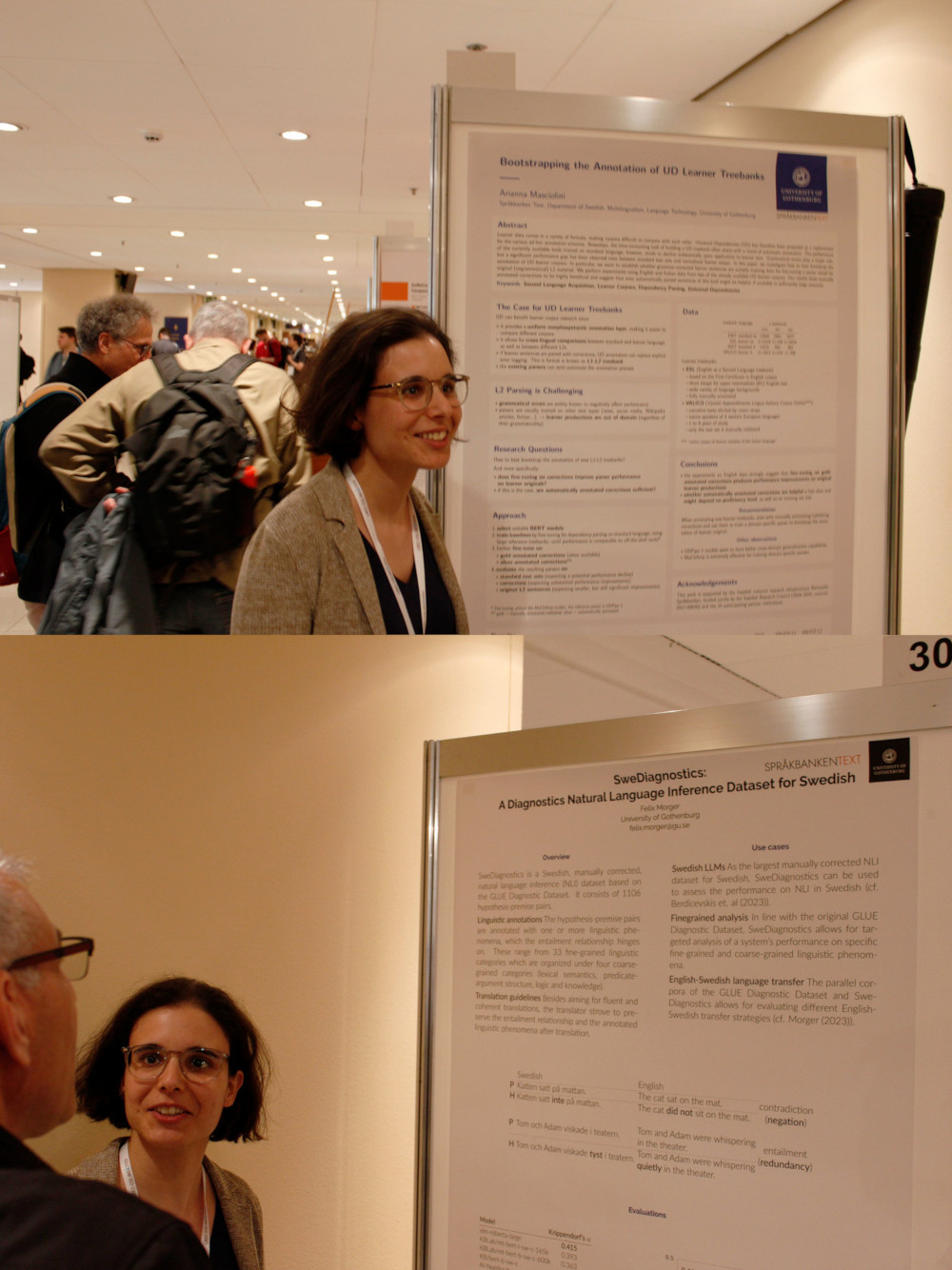 Arianna Masciolini presenting both her work on L2 parsing and the SweDiagnostics dataset on behalf of Felix Morger at the Building and Using Comparable Corpora (BUCC) workshop.
Arianna Masciolini presenting both her work on L2 parsing and the SweDiagnostics dataset on behalf of Felix Morger at the Building and Using Comparable Corpora (BUCC) workshop.
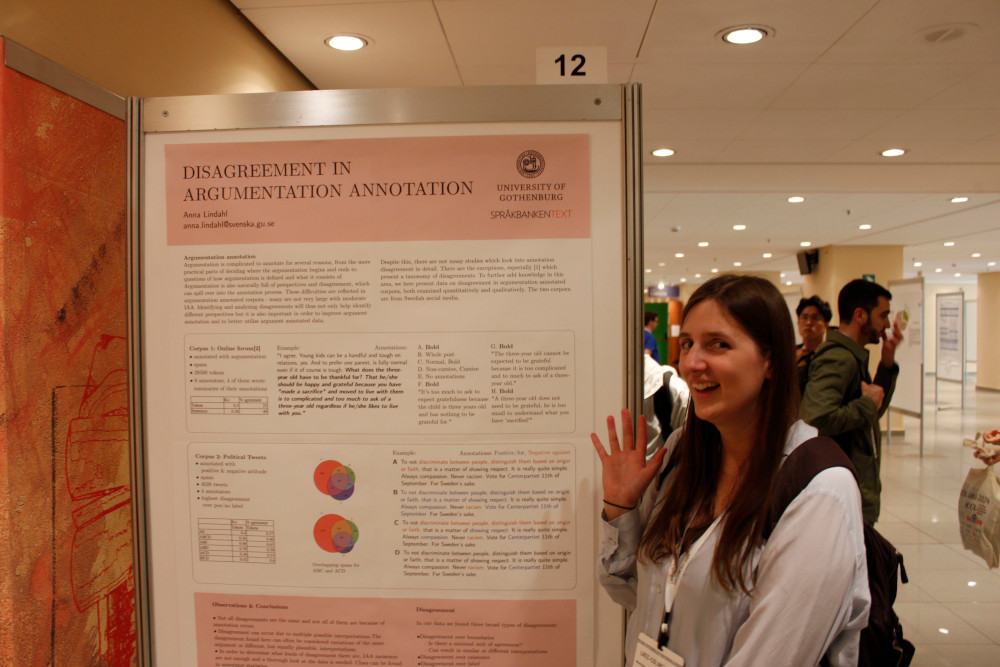 Anna Lindahl with her poster on disagreement on argumentation annotation at the NLPerspectives workshop.
Anna Lindahl with her poster on disagreement on argumentation annotation at the NLPerspectives workshop.
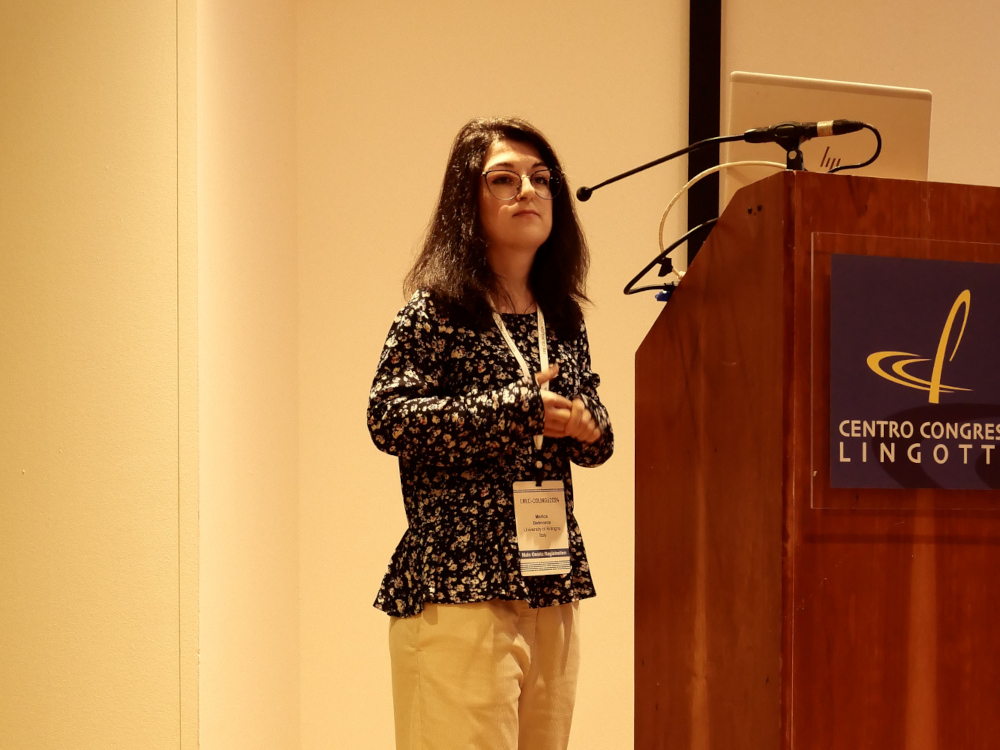 Marica Belmonte presenting her work on the study of rhythm features of patients with mild cognitive impairment and dementia and how they can be used to detect these conditions pathological speech in dementia patients at the RaPID workshop. This was work partly made during her internship at Språkbanken Text with Dimitrios Kokkinakis, the workshop organizer.
Marica Belmonte presenting her work on the study of rhythm features of patients with mild cognitive impairment and dementia and how they can be used to detect these conditions pathological speech in dementia patients at the RaPID workshop. This was work partly made during her internship at Språkbanken Text with Dimitrios Kokkinakis, the workshop organizer.
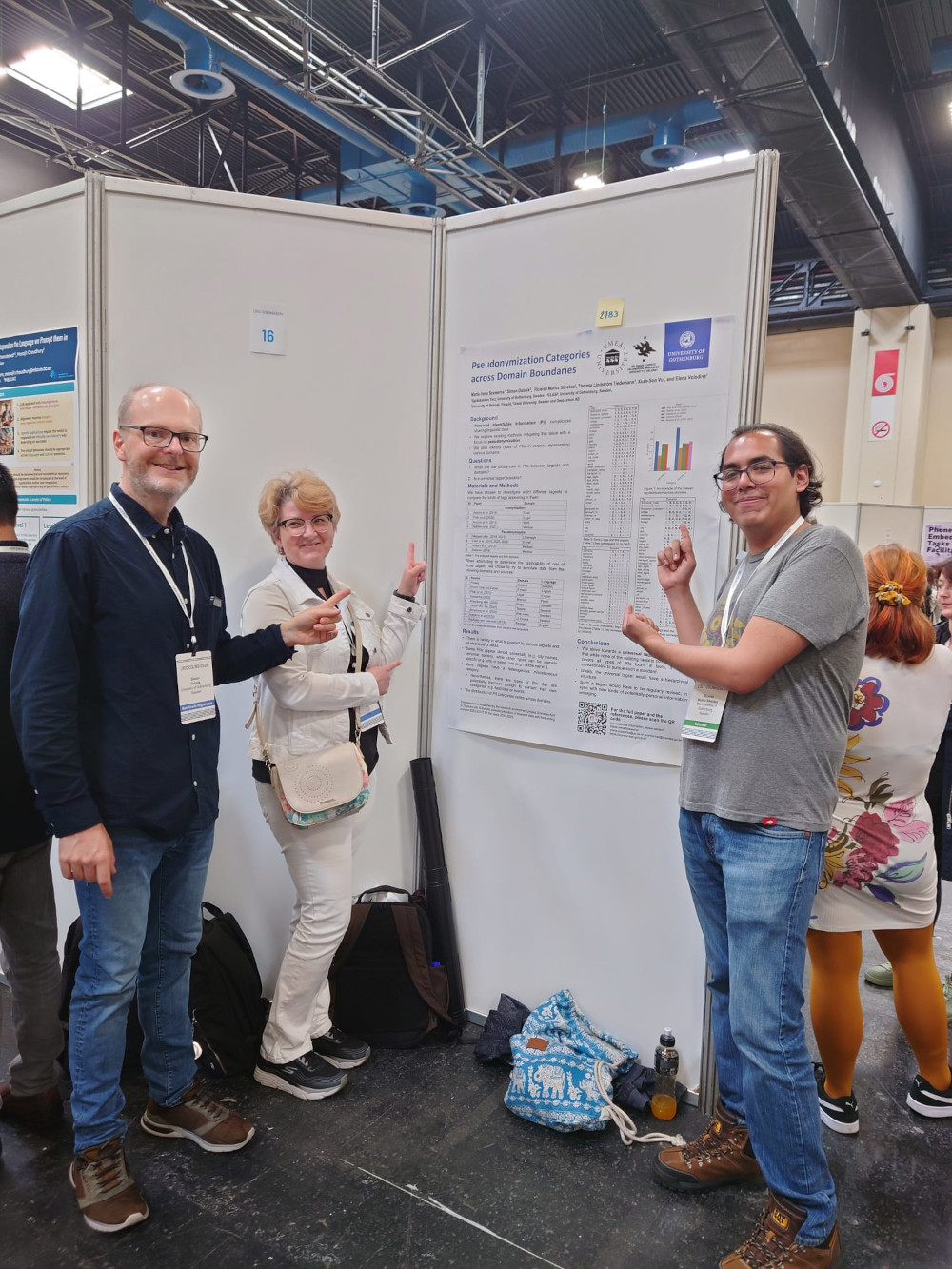 Elena Volodina, Ricardo Muñoz, and Simon Dobnik with the poster on pseudonymization categories at one of the LREC-COLING poster sessions. This work was made in the context of the Mormor Karl project in conjunction with Maria Szawerna, who followed the conference remotely.
Elena Volodina, Ricardo Muñoz, and Simon Dobnik with the poster on pseudonymization categories at one of the LREC-COLING poster sessions. This work was made in the context of the Mormor Karl project in conjunction with Maria Szawerna, who followed the conference remotely.
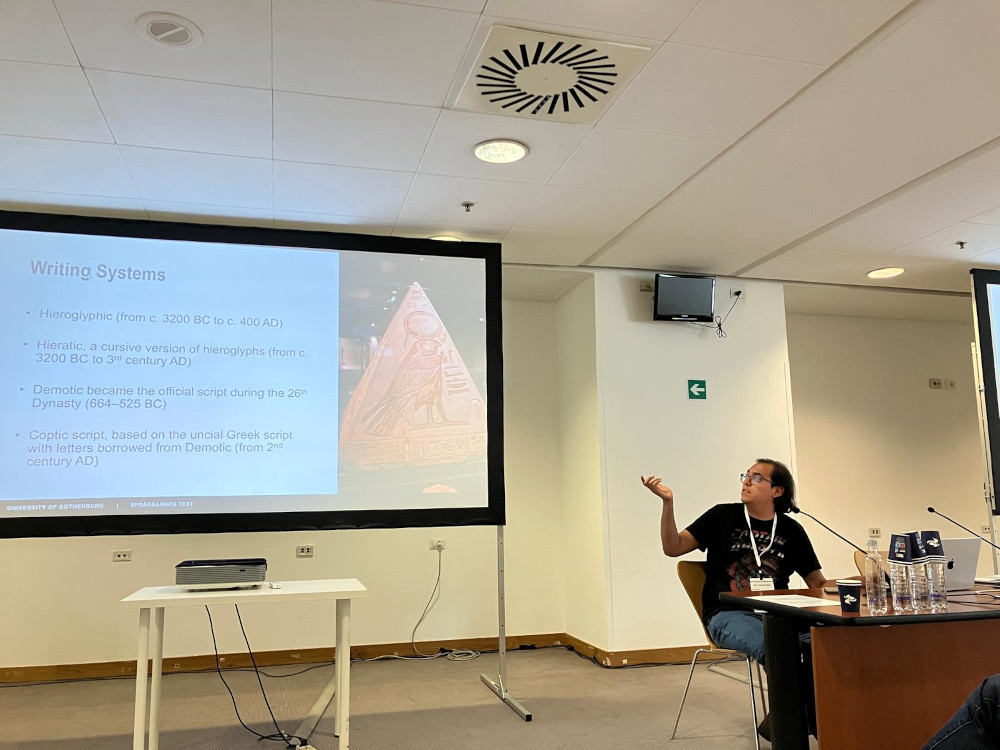 Ricardo's presentation on the use of NLP to study Ancient Egyptian at the Workshop on Language Technologies for Historical and Ancient Languages. Ricardo was also one of the heoric conference volunteers.
Ricardo's presentation on the use of NLP to study Ancient Egyptian at the Workshop on Language Technologies for Historical and Ancient Languages. Ricardo was also one of the heoric conference volunteers.
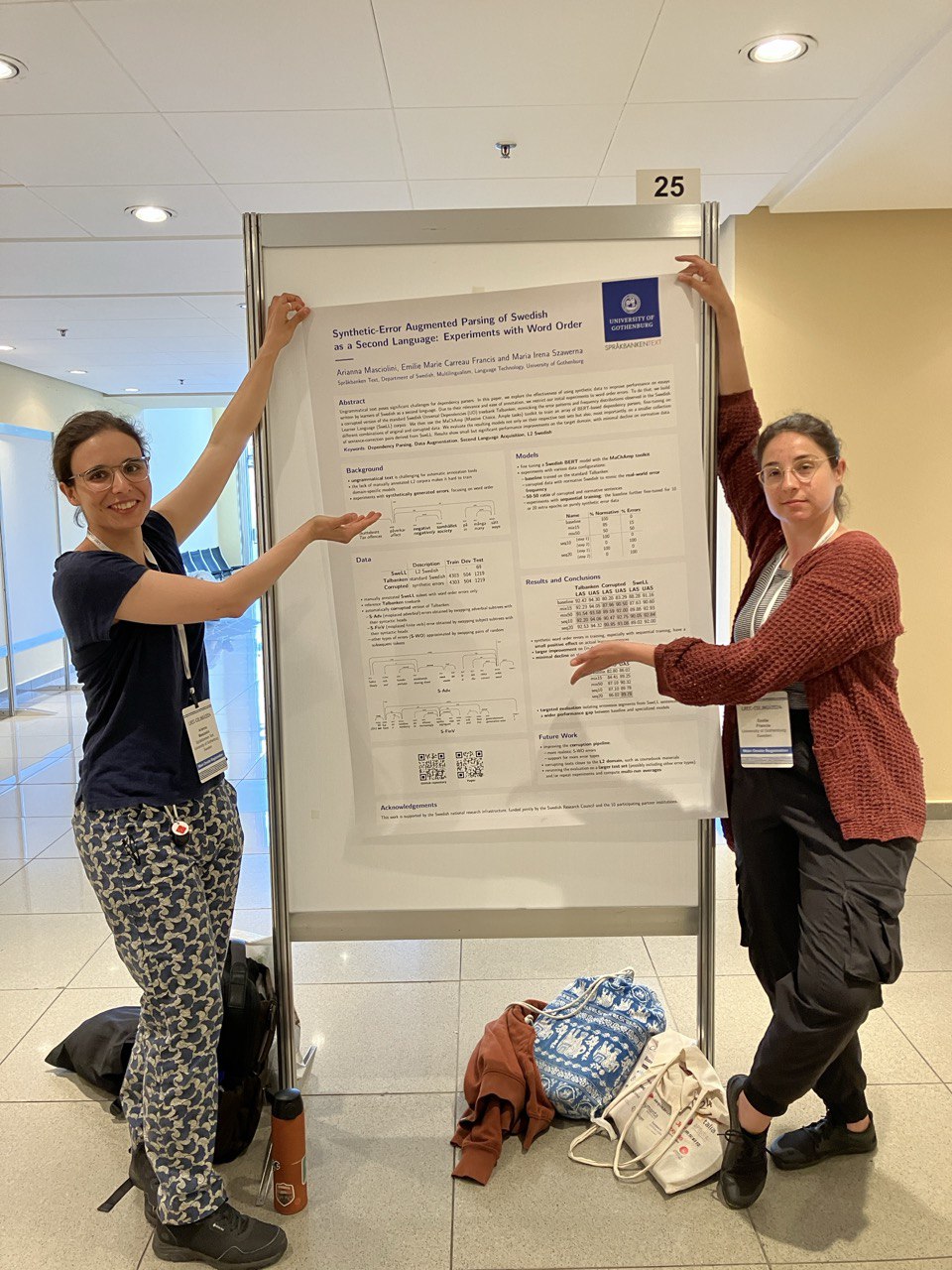 Arianna and Emilie's poster presentation on synthetic word order error generation at the Joint Workshop on Multiword Expressions and Universal Dependencies. This was also joint work with Maria.
Arianna and Emilie's poster presentation on synthetic word order error generation at the Joint Workshop on Multiword Expressions and Universal Dependencies. This was also joint work with Maria.
Social Events
Conferences always provide great opportunities to talk and socialize with other attendants. This can range to short conversations in the hallways and during coffee breaks to going out for lunch and/or dinner with other research groups. Whichever the medium, it's always a pleasure to meet new people, reconnect with old acquaintances, or finally meeting online collaborators in person. For instance, the conference gave us a chance to strengthen our ties with the Slovenian team, which also had excellent representation in Turin. On top of that, the organizers of the conference also provided two social events as part of the conference.
The welcome reception was in Lingotto Fiere, the same location as the poster sessions from the main conference. In its previous life, this was a warehouse for the old FIAT factory. Even though the architecture of the place lead to some funky acoustics, especially at the far end where we were hanging out, we still had a good time and rummaged the food tables in search for new things to try out.
The other social event was the gala dinner at the Officine Grandi Riparazioni, formerly a train repair workshop. Despite the name of the event, it was neither a gala nor a dinner (as it was more of a buffet and concert). Good food abounded and we got to enjoy a Queen cover band. After a while, we decided to take a break from the live music and go enjoy a Negroni at the lobby of the event hall.
Closing Remarks
Overall we think that LREC-COLING was a great way to show the NLP community the work that we are doing at Språkbanken text. This will allow more people to know about our tools and resources, thus increasing the chances for collaboration. For instance, there was a paper at the conference that used the SweLL corpora for grammatical error correction and another one which adapted the SVALA annotation tool for Slovene.
Moreover, it provided us with networking opportunities, expanding our research and professional networks. As with outreach, this will allow for more collaboration opportunities and to increase the international ties that our research group has. We consider that this is an important part of our doctoral education and we are thankful to have been granted this opportunity.
In general, we consider that LREC-COLING was a fun experience and a great bonding experience that we hope we can repeat sometime in the future.
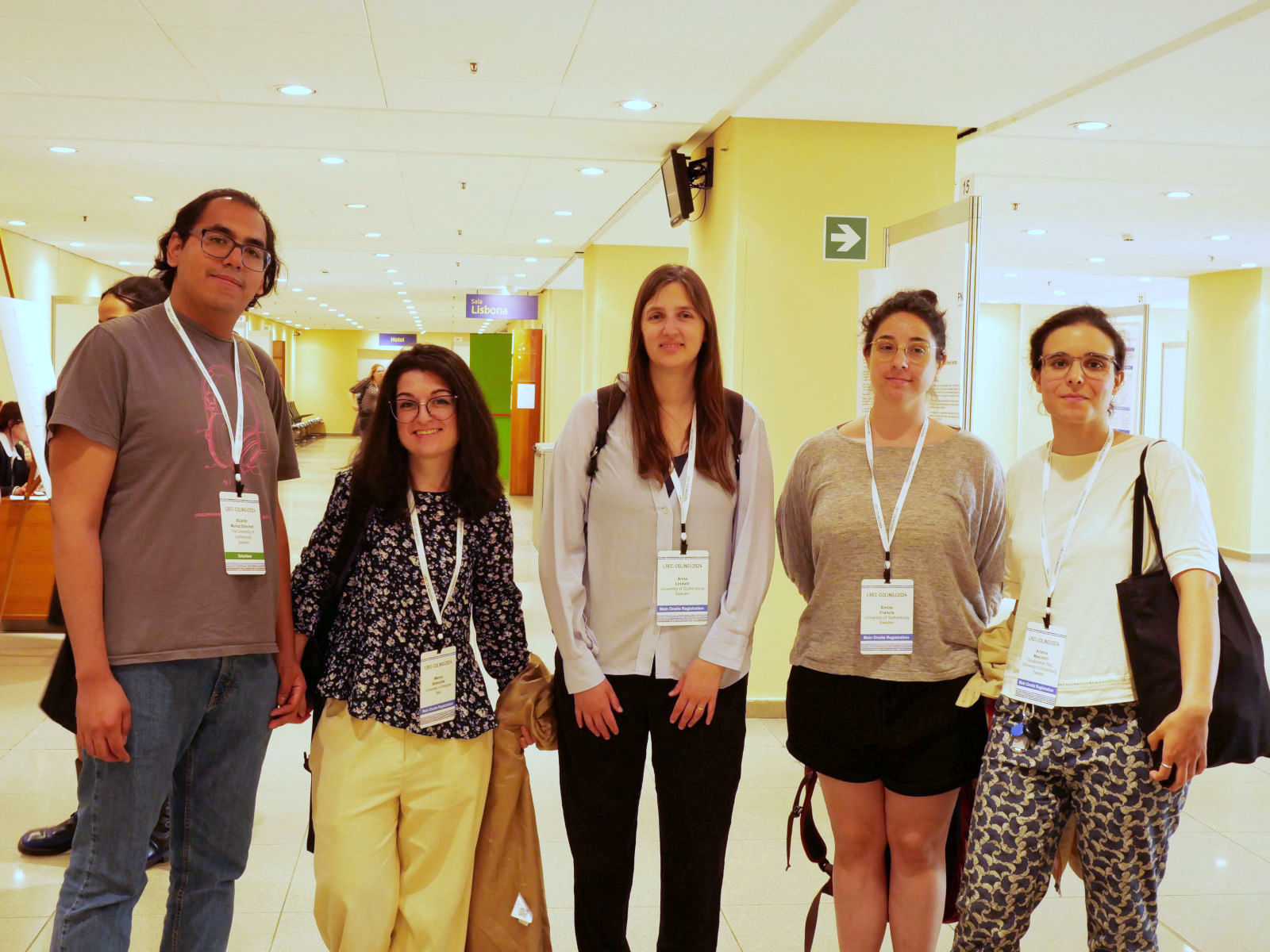 The Språkbanken Text students that were onsite at LREC-COLING. From left to right: Ricardo, Marica, Anna, Emilie, and Arianna.
The Språkbanken Text students that were onsite at LREC-COLING. From left to right: Ricardo, Marica, Anna, Emilie, and Arianna.

